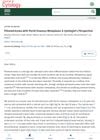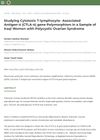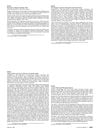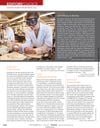Search
for
Sort by
Research
270-297 / 297 results
research Ox40-Cre-Mediated Deletion of BRD4 Reveals an Unexpected Phenotype of Hair Follicle Stem Cells in Alopecia
Deleting the BRD4 protein in certain skin cells causes hair loss and skin inflammation.

research Dermatologic Toxicities Associated with Chronic Gamma-Secretase Inhibitor Treatment for Desmoid Tumor
Most patients experienced mild to moderate skin problems during a trial for a desmoid tumor treatment.

research NUDT15, FTO, and RUNX1 Genetic Variants and Thiopurine Intolerance Among Japanese Patients With Inflammatory Bowel Diseases
Genotyping for NUDT15 p.Arg139Cys can help predict thiopurine side effects in Japanese IBD patients.

research Pilomatricoma With Florid Osseous Metaplasia: A Cytologist’s Perspective
A rare skin tumor with bone formation was successfully removed without recurrence.

research Dysregulated Behavior of Hair Follicle Stem Cells Triggers Alopecia and Provides Potential Therapeutic Targets
Misbehaving hair follicle stem cells can cause hair loss and offer new treatment options.

research Industry Updates from the Field of Stem Cell Research and Regenerative Medicine in June 2019
In June 2019, the stem cell research field saw major progress, including new clinical trials, FDA approvals, and industry collaborations.

research Clinicopathologic Case 2: Multiple Intraoral White Lesions in a 55-Year-Old Female
The patient was diagnosed with oral lichen sclerosus and needs long-term monitoring.

research Studying Cytotoxic T-Lymphocyte-Associated Antigen-4 (CTLA-4) Gene Polymorphism in a Sample of Iraqi Women with Polycystic Ovarian Syndrome
The CTLA-4 gene change studied does not affect Polycystic Ovarian Syndrome in the women tested.

research Mesenchymal Stem Cells and Cell-Free Preparations for Treating Atopic Dermatitis
Mesenchymal stem cells and their secretions might help treat chronic skin inflammation in atopic dermatitis.
research Adult Stem Cells as an Alternative Source of Multipotential Cells in Regenerative Medicine
Adult stem cells can become many different cell types, offering wide possibilities for repairing damaged tissues.

research Fat Transplant: Amazing Growth and Regeneration of Cells and Rebirth With the Miracle of Fat Cells
Fat transplants using a patient's own fat can rejuvenate and repair tissues effectively.

research The Biphasic Regulatory Effect of Diphencyprone on Mouse Hair Growth and Its Relation to Protein Kinase C Isoforms
Diphencyprone initially increases mouse hair growth, then slows it, possibly due to changes in specific protein levels.
research C3-C4 Shingles Post Hematopoietic Stem-Cell Transplantation
A 12-year-old boy had severe shingles and skin damage after a stem-cell transplant.

research Nail Changes in Patients with Graft-Versus-Host Disease
Patients with graft-versus-host disease often have nail changes related to the nail matrix, with severity not linked to skin condition.

research Dual Improvement of Alopecia Areata and Immune Thrombocytopenia With Baricitinib: A Case Report
Baricitinib may effectively treat both alopecia areata and immune thrombocytopenia.

research Finding Parallels: Scientific Discoveries in Neuroprotection, Research Self-Efficacy, Metastasis Inhibition, Tumor Suppression, Membrane Channel Regulation, Nanoscale Deformation, and Frequency Shift Detection
Human stem cells can aid stroke recovery, research experiences boost students' career aspirations, minoxidil may reduce cancer spread, a molecule can slow tumor growth, a protein affects water flow in cells, magnesium behaves differently at tiny scales, and a new method detects slow-moving objects.

research Self-Efficacy Is the Key: Impact of Undergraduate Research Experiences on Research Skills and Career Aspirations
Undergraduate research experiences boost students' research skills, confidence, and career aspirations.

research Stroke Recovery: Generation of Highly Pure Astroglia Progenitors from Human Embryonic Stem Cells and Their Neuroprotective Effects
Transplanted human Olig2+ astroglia may help improve learning and memory after a stroke.

research Slowly Does It
Special astrocytes improved learning and memory in rats after a stroke.
research Characteristics and Outcomes of Patients on Tofacitinib for Alopecia Areata or Rheumatoid Arthritis: A Retrospective Cohort Study
Patients with rheumatoid arthritis using tofacitinib had more serious side effects than those with alopecia areata.

research Endocrine Disorders and Hormonal Therapy for Adolescent Acne
Hormonal therapies are safe and effective for treating acne in female adolescents, with specific treatments for those with endocrine disorders.

research Hair Resistance to Mechanical Wear
Hair's resistance to wear varies by ethnicity and treatment, with less wear indicating stronger hair.

research Cure Most Diseases by Logical Nutrition Treatment: The Society Agent Simulating and Usage of Oral and Dental Diseases to Predict Criminals Earlier
The document suggests using natural remedies like bloodletting and honey for various health issues but lacks scientific evidence for their effectiveness.

research Polymorphism of Exon V of Prolactin Gene and Its Association With Cashmere Traits in Changthangi Pashmina Goats
The prolactin gene polymorphism doesn't affect cashmere quality in these goats.
research Effects of Withania Somnifera Root Extract Serum Application on Hair Health in Healthy Adults: A Prospective, Double-Blind, Randomized, Parallel, Placebo-Controlled Study
Ashwagandha serum improves hair health and quality of life in people with hair loss.

research Androgenic Alopecia Is Associated With Less Dietary Soy, Higher Blood Vanadium, and rs1160312 Polymorphism in Taiwanese Communities
Men with more vanadium in their blood and who drink less soy milk are more likely to have hair loss.